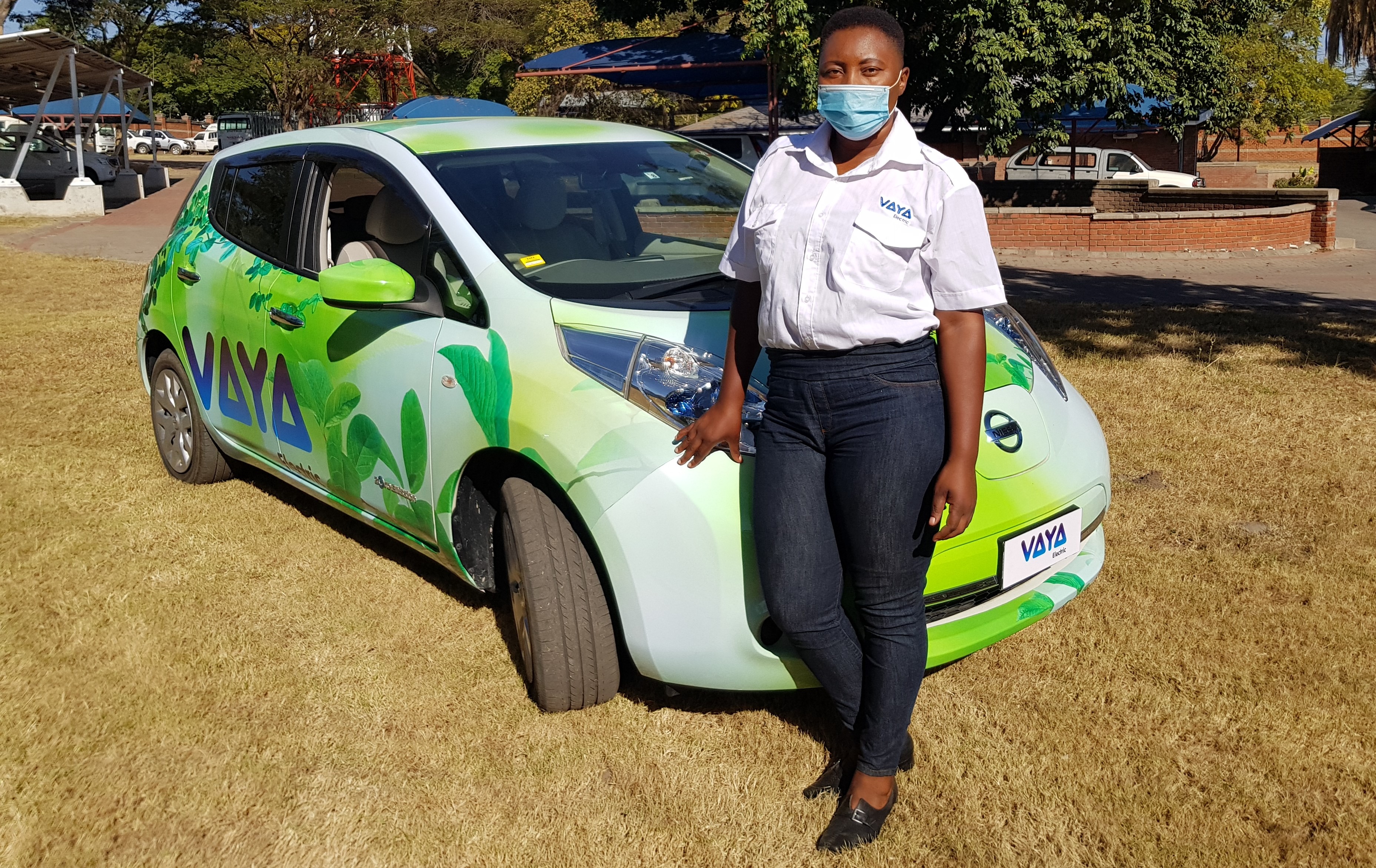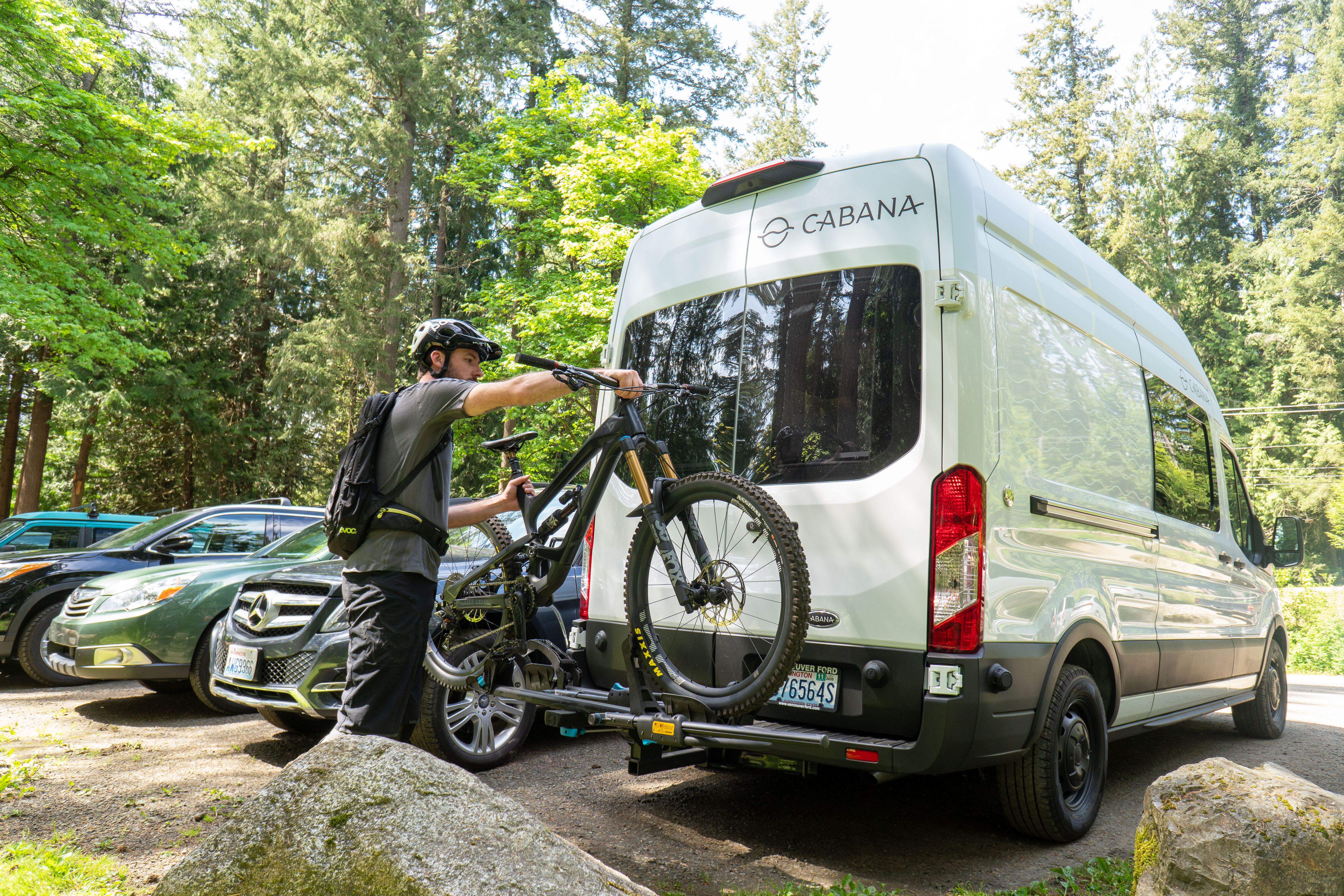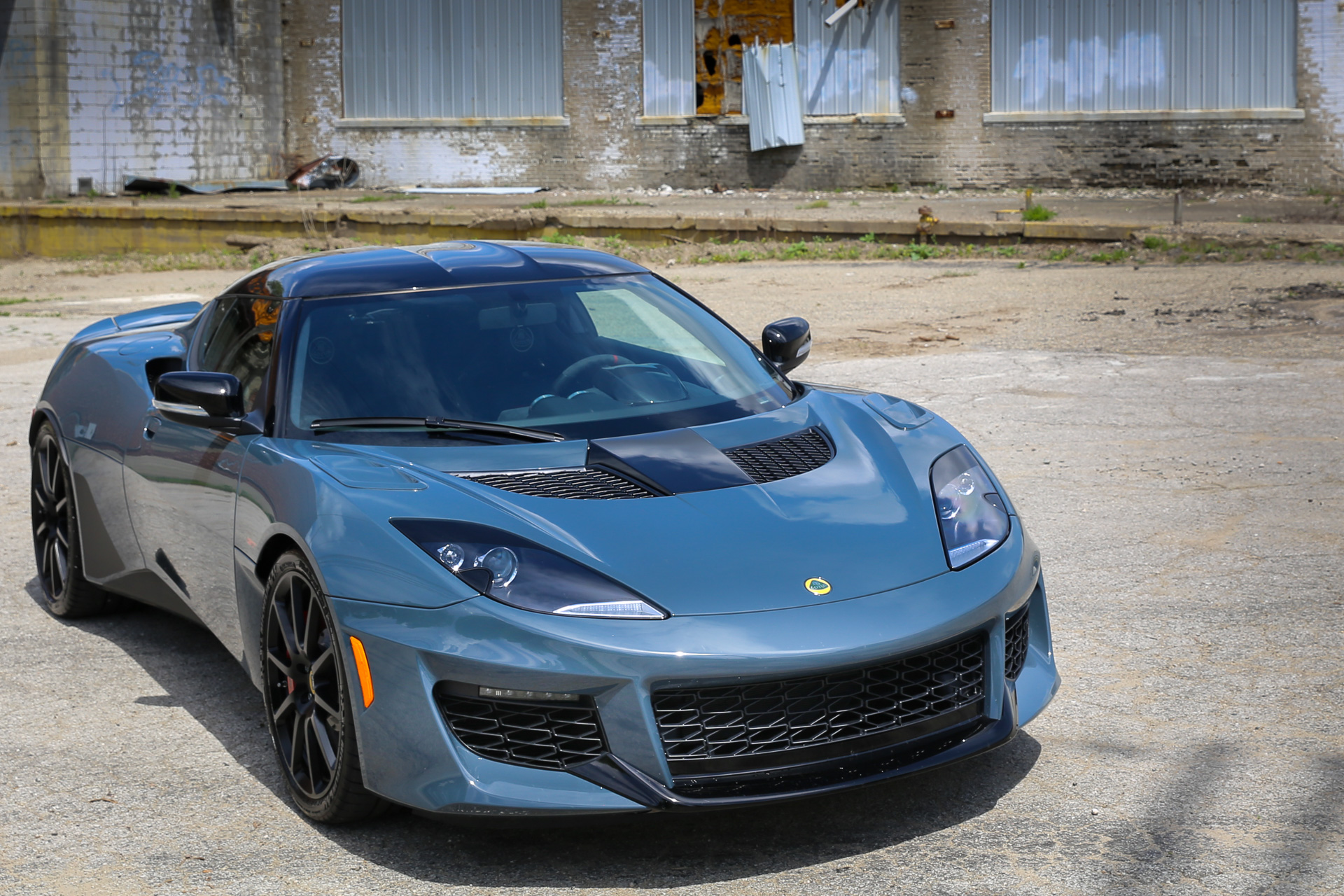The Station: Amazon eyes Zoox, Aurora goes back to school and Cabana hits the road
The Station is a weekly newsletter dedicated to all things transportation. Sign up here - just click The Station - to receive it every Saturday in your inbox.
Hi and welcome back to The Station, a newsletter dedicated to all the present and future ways people and packages move from Point A to Point B. I'm your host Kirsten Korosec, senior transportation reporter at TechCrunch.
The mobility world got busy this week. Really. busy. This is gonna be a long one, buckle up.
Take a look at the most recent survey we conducted with a bunch of venture capitalists about mobility and what areas interest them most. We talked to Ernestine Fu with Alsop Louie Partners, Stonly Baptiste and Shaun Abrahamson with Urban Us, Shahin Farshchi with Lux Capital, Kate Schox with Trucks VC and Jeff Peters of Autotech Ventures.
Reach out and email me at kirsten.korosec@techcrunch.com to share thoughts, criticisms, offer up opinions or tips. You can also send a direct message to me at Twitter - @kirstenkorosec.
Alright, time to dig in. Vamos.
Micromobbin'Uber tossed more than 20,000 JUMP bikes into a recycling yard following its deal to offload the JUMP brand to Lime. A photo below, courtesy of Cris Moffitt, shows a sliver of the thousands of bikes at the yard in North Carolina.
The extent of waste is unfathomable," the Bike Share Museum said in a tweet.
Since then, Tier Mobility CEO and co-founder Lawrence Leuschner said he wants to take some of those bikes, repair them, and give them a second life - as we do for all of our vehicles," he wrote on LinkedIn.
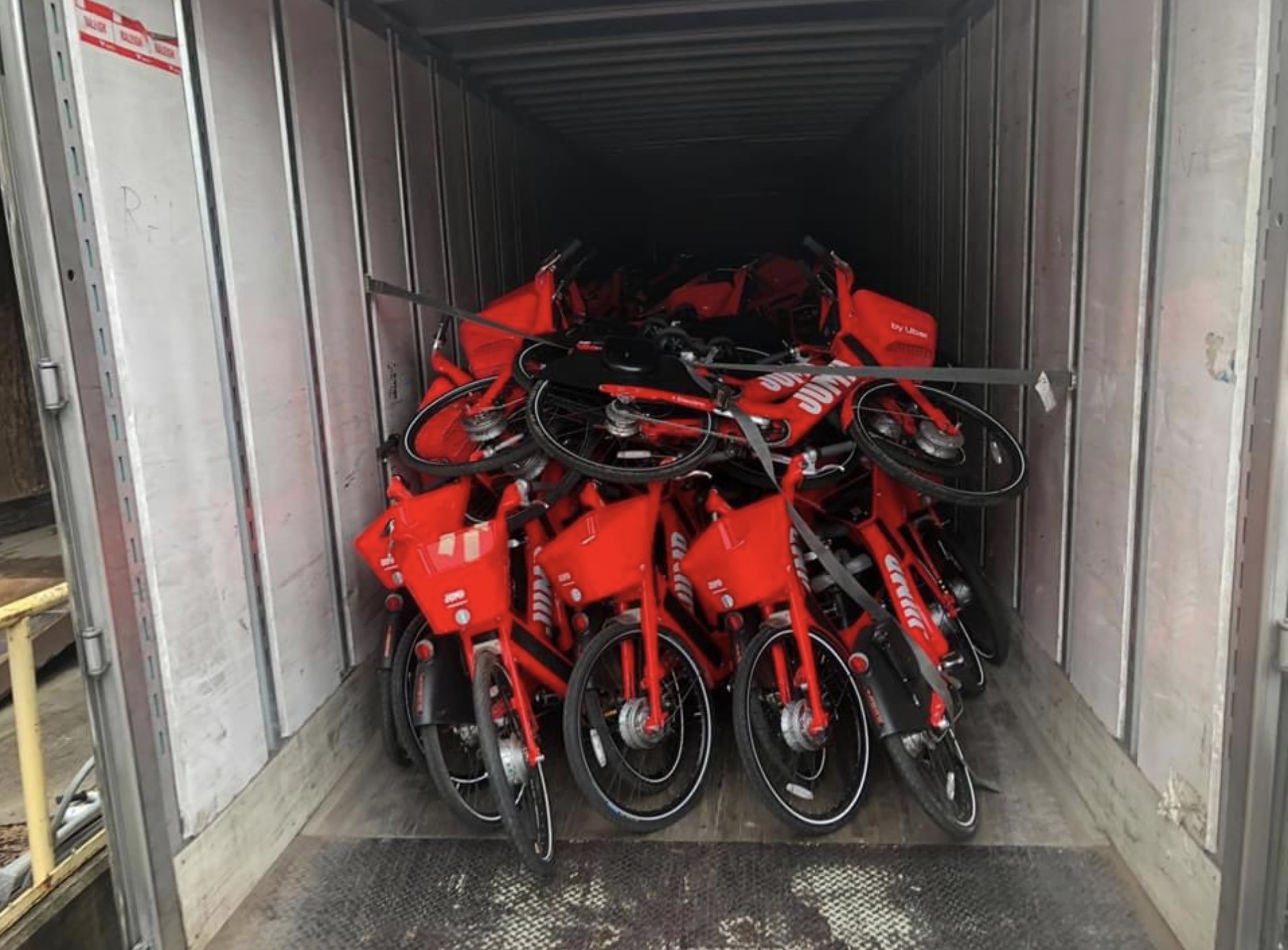
Image Credits: Cris Moffitt
Keaks (Kirsten Korosec) has been working on a big(ish) story about JUMP for the last week. Stay tuned and/or holler at her if you have any tips.
Meanwhile, we noticed Superpedestrian, the startup that makes self-diagnosing electric scooters, has teamed up with Zagster. Superpedestrian quietly launched LINK, its shared electric scooter service in partnership with Zagster in Fort Pierce, Florida in late December.
As of at least February 2020, Zagster had an agreement with Superpedestrian's LINK to manage the fleet of shared scooters in Kansas, according to city commission documents. In March, the city council in Manhattan, Kansas authorized the city to negotiate a permitting contract with Zagster to run a six-month electric scooter pilot in partnership with Superpedestrian's LINK.
Over in Europe, long-distance ridesharing startup BlaBlaCar said it's expanding to scooter sharing. The company doesn't plan to operate its own fleet of scooters. Instead, BlaBlaCar is partnering with Voi, a European e-scooter service that has raised $136 million over multiple rounds. Voi scooters will feature three different brands - Voi, BlaBlaCar and BlaBla Ride.
- Megan Rose Dickey
Deal of the weekIt's not a deal yet - well, as far as we know, but I'd be remiss not to highlight it here. I'm talking, of course, about the WSJ report that Amazon is in advanced talks to acquire self-driving vehicle startup Zoox.
Zoox is unlike any other autonomous vehicle startup I've encountered in the past five or so years. The company has taken on several capitally intensive and ambitious roles - electric vehicle designer and manufacturer, full stack autonomous vehicle developer and robotaxi operator. Zoox co-founder Jesse Levinson will disagree with me here - we've had this discussion before - but the company is essentially doing this alone. Yes, it has relationships and support from suppliers; it has investors. But it doesn't have a meaningful OEM partner and backer like its competitors Argo AI and Cruise . And it has no where near the piggy bank that Waymo holds.
It's a bold and risky strategy. It's also expensive.
It's a poorly kept secret that Zoox has had to do some belt tightening over the past 12 months. The company cut costs last year and tried to renegotiate some supplier contracts, sources told me at the time. In October, it raised $200 million in new convertible note funding, which was supposed to be folded into a Series C round and close by the end of 2019 or early 2020. As far as we know, that never happened. Sources have told me Zoox was in talks with OEMs about sealing a deal with a manufacturing partner that might also include financial backing. Daimler and FCA were name dropped in different conversations at the time, but I was never able to verify that the deals were close.
Then COVID-19 hit. Zoox tightened its belt further and cut nearly all of its contract drivers.
There's no doubt that Zoox needs money to survive. But an Amazon-Zoox deal, if it happens, is bittersweet.
Zoox is the plucky startup - the stand-at-the-cliff's edge pioneer that you want to succeed. Going it alone carries existential risk, but it has also given it the freedom to stick to its vision.
If acquired, Zoox will get sucked up into the Amazon ether and one wonders what it will become.
Other deals that got our attention:
Bolt, the Estonia-based company that provides on-demand ridesharing, scooters and other transportation services across some 150 cities in Europe and Africa, raised 100 million ($109 million) in a convertible note. Bolt also confirmed that is now valued at 1.7 billion (or nearly $1.9 billion at today's rates). The money is coming from a single investor, Naya Capital Management, which was also a major backer of the company in its last round, a $67 million Series C announced in July 2019.
Ola Electric, the EV business that spun out of the ride-hailing giant Ola in 2019, acquired electric scooter startup Etergo. The Dutch startup built a scooter that uses a swappable, high energy battery that delivers a range of up to 240 km (149 miles). Ola Electric is aiming to produce and launch its own line of two wheelers as soon as this year.
Tesla's board certified a financial milestone that unlocks the first tranche - worth more than $700 million - of an unprecedented multi-billion-dollar pay package for CEO Elon Musk, according a document filed Thursday with the Securities and Exchange Commission. The milestone allows Musk to purchase the first grouping or tranche of nearly 1.69 million shares at a steep discount. As far as we know (based on SEC filings) Musk has not exercised those options yet.
AV spotlight: AuroraIf you haven't heard, there's a battle over talent in the autonomous vehicle industry. One AV founder once described it to me as a knife fight."
It's not just about hiring talent though. It's about building the right culture to get the job done. In this case, it's the not-so-small goal to develop and deploy autonomous vehicle technology at commercial scale.
Self-driving vehicle startup Aurora recently hit the 500-employee mark, an internal milestone capped by several new key hires, including Sagar Behere, as director of systems and safety engineering and Tara Green, who is leading human resources, recruiting and IT.
It wasn't the 500-employee figure that I found interesting. It's a new in-house program the company is calling Aurora Academy and Raul Rojas, a former professor of computer science and mathematics at the Free University of Berlin who was hired to lead it. The idea is to create a program where employees can build specific technical skills in the self-driving technology domain using its own experts. Rojas comes with deep background in robotics and autonomous vehicle technology. He met two of Aurora's co-founders Chris Urmson and Drew Bagnell while participating in the 2007 DARPA Urban Challenge. Rojas also co-founded in 2011 Autonomous GmbH, an autonomy startup acquired by TomTom in 2017.
Aurora has hired computer scientists, engineers, physicists, and mathematicians to help in the complex task of integrating different hardware and software modules into an AV system. And yet, Rojas noted there is still a need to build bridges across the various disciplines so that we can propagate expertise across all levels of the company." He said that's where Aurora Academy comes in.
The program kicked off in mid-March with a six-week course entitled Essential Skills for Poses, Transformations and Lie Groups." (Light stuff, right?) These are the mathematical tools that give roboticists a uniform and powerful framework for localization and motion planning.
Other classes will cover software engineering, sensor development, mathematical foundations, visualization, planning, control and machine learning. The academy will also be open to non-technical employees who want to learn more diverse skills, including how to program in Python.
The self-driving world is still a small community, so there's a limited pool of candidates to begin with, and not many universities offer specialized programs on autonomous driving, so it's unlikely you will find someone right out of school with all the skills needed," Rojas said.
For instance, Aurora acquired last year Blackmore, one of the few companies developing Frequency Modulated Continuous Wave (FMCW) lidar, which emits a low-power and continuous wave.
It's unlikely someone could have studied it in school, so in June we're starting a course to teach the physics of Doppler lidar, how to process the data at the fastest possible rate, and how to profit from the measurements in perception tasks," Rojas noted.
Is your AV company doing something interesting - you know, beyond bringing autonomous vehicles into the mainstream? Hit me up and tell me about it.
Dispatches from AfricaOn demand mobility powered by electric and solar is coming to Africa.
Vaya Africa, a ride-hail mobility venture founded by Zimbabwean mogul Strive Masiyiwa, launched an electric taxi service and charging network in Zimbabwe this week with plans to expand across the continent.
The South Africa-headquartered company is using Nissan Leaf EVs and has developed its own solar-powered charging stations. Vaya is finalizing partnerships to take its electric taxi services on the road to countries that could include Kenya, Nigeria, South Africa and Zambia, Vaya Mobility CEO Dorothy Zimuto told TechCrunch.
The initiative comes as Africa's on-demand mobility market has been in full swing for several years, with startups, investors and the larger ride-hail players aiming to bring movement of people and goods to digital platforms.
Uber and Bolt have been operating in Africa's major economies since 2015, where there are also a number of local app-based taxi startups. Over the last year, there's been some movement on the continent toward developing EVs for ride-hail and delivery use, primarily around motorcycles.
Beyond environmental benefits, Vaya highlights economic gains for passengers and drivers of shifting to electric in Africa's taxi markets, where fuel costs compared to personal income is generally high for drivers.
Using solar panels to power the charging station network also helps Vaya's new EV program overcome some of challenges in Africa's electricity grid.
Vaya is exploring EV options for other on-demand transit applications - from min-buses to Tuk Tuk taxis.
- Jake Bright
Layoffs, business disruptions and peopleLet's kick this section off this week by highlighting a new company hoping to disrupt van life.
Cabana is a new startup launched by a former Lime executive that's bringing tricked-out vans with all the amenities of a Holiday Inn hotel room to cities on the West Coast, starting in Seattle. As TechCrunch reporter Jonathan Shieber noted, companies like Tentrr, HipCamp and even Airbnb have gotten in on the vanlife movement, and Cabana's founder definitely thinks he can ride the wave.
Cabana has already raised $3.5 million from investors, led by Craft Ventures - the investment firm founded by David Sacks. Other investors include Goldcrest Capital, Travis VanderZanden (the chief executive and founder of Bird), and Sunny Madra, vice president of Ford X at Ford Motor Company.
Hiring newsRivian appears to be planning to offer its own insurance to customers based on a new job posting for an insurance agency data manager first spotted by RivianForums, which passed along the tip.
The job is to lead Rivian's property and casualty (P&C) insurance agency, a position that entails recruiting, training, coaching and managing employed licensed sales agents and an insurance customer care team, according to the posting on Rivian's website. The employee will also sell insurance products and provide feedback to partners on opportunities, the posting said. It's an unusual move, but not unprecedented. Last August, Tesla launched an insurance product.
Cruise has a new board member who comes with deep experience in tech and hardware. Regina Dugan has a lengthy resume that includes former director of the Defense Advanced Research Projects Agency and the current CEO of Wellcome Leap, a non-profit founded by Wellcome Trust to accelerate innovations that benefit global health. In between DARPA and Wellcome Leap, Dugan was head of Google's Advanced Technology And Products (ATAP) Group and led Building 8, Facebook's hardware skunkworks.
In health care and in transportation, I believe in the power of science and technology to change our world. With this power comes the responsibility to deliver life-saving advances at scale - Cruise has the tech, the team, and the tenacity to get it done. I'm stoked to join," Dugan said in a statement provided to TechCrunch.
Sweden-headquartered Voi Technology recruited Richard Corbett to head up its U.K., Ireland and Benelux operations. Corbett joins from rival Bird, where he spent two years as the U.S. company's U.K. and Ireland chief, as well as helping to launch e-scooter rentals in Netherlands.
Layoffs and other departuresAirMap, an airspace services platform for unmanned aircraft, cut its staff. Layoffs.fyi reported that around 30% of the team was let go.
Aston Martin announced CEO Andy Palmer was leaving his post. His replacement is Tobias Moers, the current head of Mercedes-Benz's AMG division, Car and Driver reported.
Welp ... Audi fired Daniel Abt from its Formula E racing team after learning he had a professional sim driver race for him during a virtual competition called the Race at Home Challenge" held last weekend. It appeared Abt was going to merely be suspended. Abt said in a video message published Tuesday on YouTube that Audi had dropped him from the team.
German auto supplier ZF Friedrichshafen plans to cut up to 15,000 jobs, or around 10% of its work force, by 2025 as a result of a slump in demand, according to a company memo that Automotive News reported. ZF said in an email to employees that half of the 12,000-15,000 job cuts would be in Germany.
Uber is cutting 600 jobs in India, or 25% of its workforce in the country. The job cuts, which affect teams across customer and driver support, business development, legal, policy, marketing, and finance, are part of the company's global restructuring that eliminated 6,700 jobs this month.
Notable reads and other tidbitsHere are a few other items that caught my eye ...
Deloitte Insights tackled a topic that many of us might be mulling as well. They looked at what mobility might look like after COVID-19. The report specifically explores four possible futures over the next three to five years. You can check out the full report here, which provides a high-level description of society, economy and geopolitics and then narrows in on transportation.
In one rosier scenario, dubbed a passing storm," the COVID-19 pandemic shakes society but, after a slow start, is met with an increasingly effective health system and political response, according to Deloitte. The pandemic causes long-term economic impact: e-commerce and last-mile delivery networks proliferate and are increasingly supported by autonomous vehicles and digitization of the logistics value chain. Vehicle sanitation becomes a priority, which leads to new self-cleaning materials, certification programs and form factors such as passenger partitions. The in-transit experience benefits from advances in digital entertainment and productivity prompted by the pandemic, including, potentially, AR and VR applications.
AV stuff ...
I recommend reserving an hour or two to play around with this Global Autonomous Vehicles Index created by the autonomous vehicles group at law firm Dentons. It's free and lets users compare the nuances of AV testing and deployment regulations across 18 countries and all 50 U.S. states. For instance, regulations in Canada don't require a human driver in a vehicle when testing AVs. In China, rules require each organization to buy the compulsory liability insurance for traffic accidents for each vehicle. Yet in Germany, there are no special requirements for AVs which go beyond the motor vehicle liability insurance.
Baidu completed Apollo Park, an autonomous driving and vehicle-infrastructure testing base that houses more than 200 autonomous vehicles and is located in the Beijing Economic-Technological Development Area. The facility is used for vehicle storage, cloud control on remotely sensed big data, operational command, maintenance and calibration, as well as research and development.
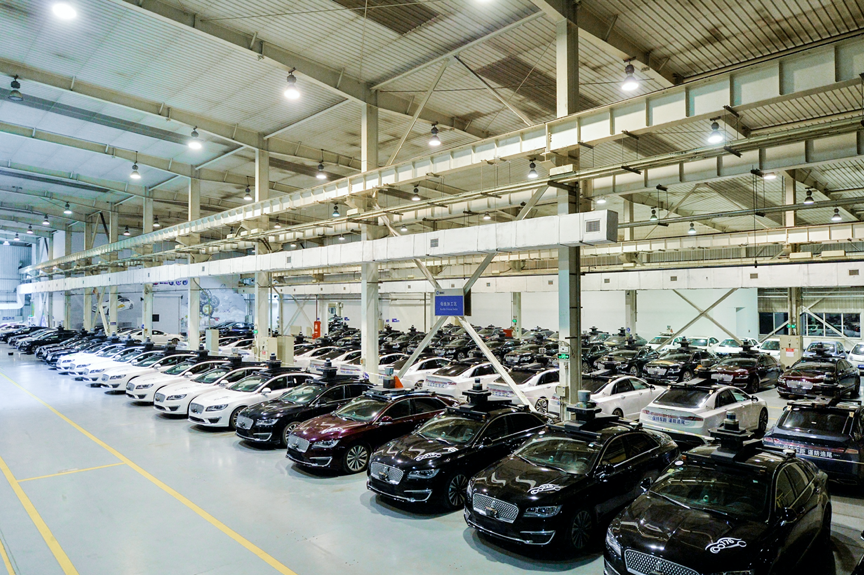
Baidu has completed Apollo Park, an autonomous vehicle testing and development center. Photo: Baidu
Waymo will bring its autonomous vehicles back to public roads in the Bay Area starting June 8, The Verge reported. The plan, according to an email viewed by The Verge, is to use the self-driving vehicles to deliver packages for two Bay Area non-profits: illustrator Wendy McNaughton's #DrawTogether, which provides art kits to Bay Area kids; and Lighthouse for the Blind and Visually Impaired.
Autonomous robotics startup Nuro will test prescription delivery in Houston through a partnership with CVS Pharmacy. The pilot, which will use a fleet of the startup's autonomous Toyota Prius vehicles and transition to using its custom-built R2 delivery bots, is slated to begin in June.
It's electric ...
Mercedes-Benz is now selling its EQV 300 all-electric premium van in Europe, the second EV to come out of the automaker's initiative to produce a line of battery-powered models under its new EQ brand.
Rivian has resumed work at its factory in Normal, Ill. following a temporary shutdown due to the COVID-19 pandemic. Investor and customer Amazon provided an update this week stating that Rivian is still on track to supply it with electric delivery vans. Vans will begin delivering to customers in 2021, as previously planned. About 10,000 electric vehicles will be on the road as early as 2022 and all 100,000 vehicles will be on the road by 2030.
Audi created a new business unit called Artemis to bring electric vehicles equipped with highly automated driving systems and other tech to market faster.
Tesla slashed prices across its electric vehicle portfolio as the automaker aims to boost sales in an economy beaten down by the COVID-19 pandemic. The Model S and Model X saw base prices cut by $5,000, while the Model 3 standard range plus saw a $2,000 drop.
Ride-hailing and miscellaneous bits ...
Uber is launching a book-by-the-hour feature in the U.S., starting Monday. The feature lets users book rides for $50 an hour and make multiple stops. The hourly booking feature, which is already available in a handful of international cities in Australia, Africa, Europe and the Middle East, will initially launch in a dozen U.S. cities.
Core Investments, a Boston-based real estate development company, has proposed a last-mile delivery station for Amazon, Boston Business Journal reported.
Review: Lotus Evora GTI delayed my first road trippin' review to make room for Matt Burns' take on his recent weekend with the $100,000 2020 Lotus Evora GT.
As Burns' explains:
The Lotus Evora GT is supersized go-kart with nary an advanced technical feature. And I love it. While most cars are coming equipped with supercomputers, the lack of technical wizardry makes the 2020 Evora GT interesting, and that's why it's on TechCrunch.
Join Burns on his ride.




